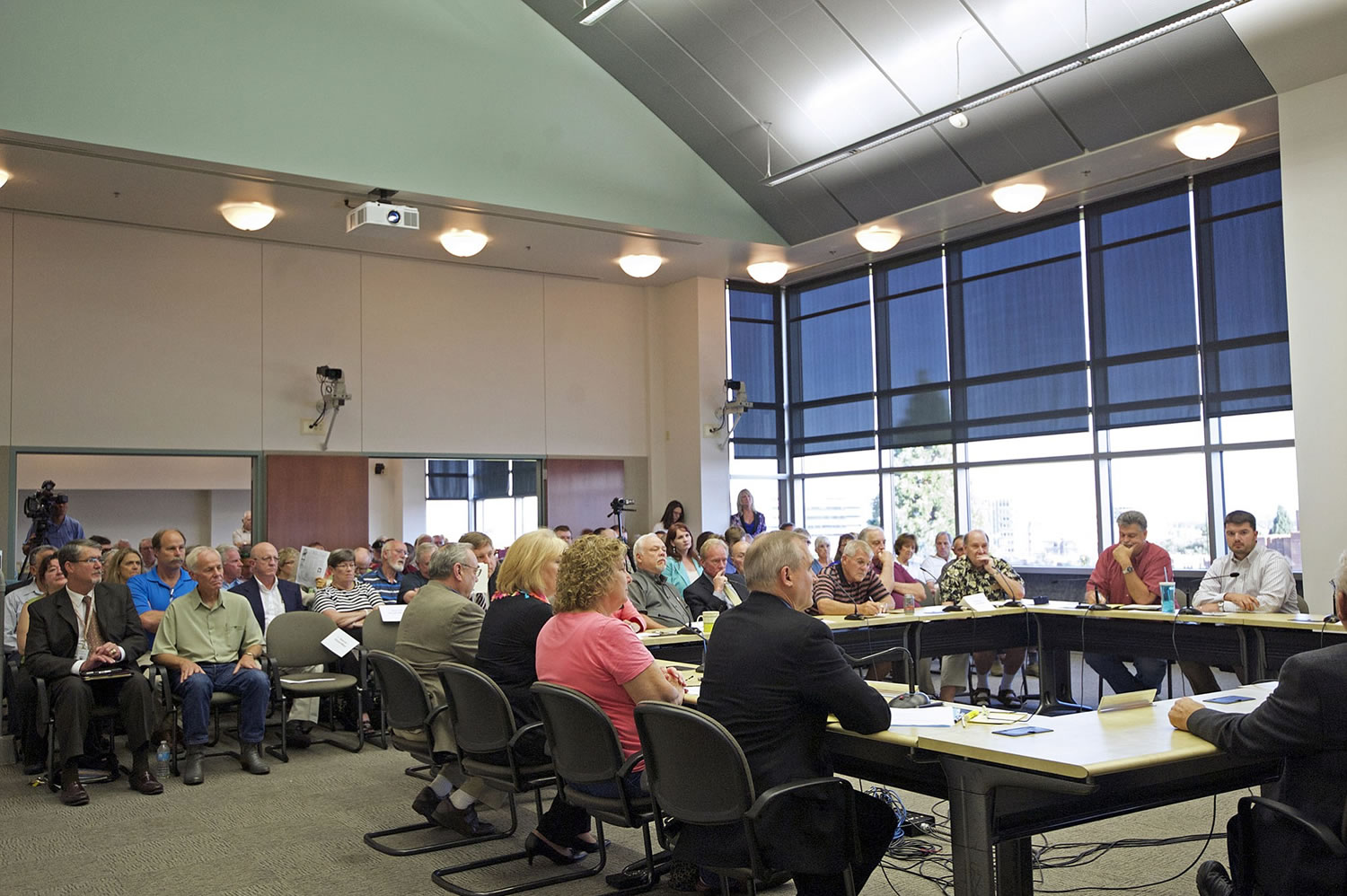The shroud of intrigue has been lifted over the latest vision for a long-discussed third bridge across the Columbia River.
FIGG Engineering Group, the Florida-based bridge designer submitting an option for the possible project, on Friday presented its early concept for an east county bridge. Championed by Clark County Commissioner David Madore, the bridge would cross the Columbia River at Southeast 192nd Avenue and state Highway 14 and land on Northeast Airport Way in Oregon.
While unveiling the first glimpse of what exists of the design, Linda Figg, the bridge company’s principal, said her firm is open to “bringing multiple options to the community.”
The option presented Friday calls for a crossing that extends from the highway in Vancouver, jogs to the west slightly, crosses Government Island and connects to Northeast Airport Way. A second phase of the project, Figg said, could eventually connect the bridge to Interstate 84.
The concrete segmental bridge, held aloft by slender columns, would feature four lanes for cars and trucks and two covered lanes, on each side of the bridge, for bike and foot traffic. Figg called it a “minimalist” design, intended not to draw attention away from the area’s natural beauty.
“Every bridge is connecting to the landscape, and it must respect that history,” Figg said. “Every bridge has a story.”
The project would cost no more than $860 million, she said, and could be completed in five years. That timeline takes into account permitting and the design-build phase, she said.
Such claims echo similar ones made by Madore, the Columbia River Crossing opponent, who’s pointed to the potential of an east county bridge as a lower-cost, common sense approach to relieving congestion.
But the timeline, and dollar amount, raised eyebrows among those in attendance at Friday’s meeting.
“How exactly are we going to pay for it?” asked state Rep. Monica Stonier, D-Vancouver.
Madore said there were funding options available, but it would take a partnership between Oregon and Washington to unlock them. He has vowed that the bridge will be toll free.
“We have to look to our state Legislatures to be good stewards of our funds,” he said.
Familiar territory
The concept of an east county bridge is nothing new.
A 2008 study found that an east-county river crossing would provide congestion relief on the I-205 corridor, possibly resulting in 15 to 20 percent fewer trips on that freeway. The same year, the Southwest Washington Regional Transportation Council included eastside crossings into a Transportation Corridor Visioning Study. An east county bridge isn’t currently in any regional long-range plans or maps in either state.
Kevin Peterson, a Friday Harbor-based architect and designer who’s been working on Madore’s east county bridge proposal, referred to the 2008 study as a road map for what could happen.
“(The east county bridge) is doable and it increases capacity,” he said.
The project would require significant buy-in from multiple agencies in both states. So far, discussions among those agencies have not taken place.
Representatives from state agencies were absent from Friday’s meeting. Don Wagner, regional administrator for the Washington Department of Transportation, said his office had received an invitation but he chose not to attend.
He called the process a “departure” from the WSDOT’s model for public input and the timing of Friday’s meeting “terrible.” It’s too early for state agencies to get involved, he said.
“Specifically, we have not been contacted with any details whatsoever about this project,” Wagner said. “If this is a county bridge they are going to build with county funds, I don’t see why I would have to be at the meeting.”
Dave Thompson, a spokesman for the Oregon Department of Transportation, said he had heard nothing official about the project and could not comment on it.
Madore has said the county will enter into more in-depth conversations with state agencies, both in Washington and Oregon, if there’s citizen support to move the project forward.
The amount of input the state has on the project will depend on how it takes shape. Madore has noted that FIGG’s design is only one “unsolicited” option and that the county — which is not paying FIGG — would welcome others through a bid process. FIGG’s design, however, will be the one used if the county moves forward with an advisory vote in November.
County commissioners will meet again Tuesday to discuss FIGG’s proposal and whether to pursue placing an advisory vote on November’s general election ballot. The vote would be used to gauge the public’s desire in investigating the proposal further.



